|
 How much should it cost to replace a hot water heater? How much should it cost to replace a hot water heater?
 |
Here in Southern California we a very special agency called the South Coast Air Quality Management District. That agency attached a surcharge of $120 to the cost of a hot water heater, I think more in an attempt to support their own salaries than anything else (yet another hidden tax), and required the hot water heaters to burn cleaner, a good thing. The burners on the hot water heaters changed radically and now resemble overhead space heaters most commonly seen in warehouses and outdoor patios. There are no flames now and the heaters are much safer, another good thing. These two hits at once doubled the price of hot water heaters a couple of years ago. Most homeowners will receive sticker shock now when replacing that hot water heater that has been faithfully serving them for 10 to 12 years.
Beware of ultra-low price estimates over the phone, most are fraudulent and most companies giving these estimates deliberately leave off many items they charge for in order to mysteriously up the price of the installation due to unforeseen factors once they start the work in your home. It is called bait and switch and it is illegal. So how do they get away with it? There are so many licensed and unlicensed plumbers in the area that the authorities cannot possibly police the trade. If you live in Orange or Los Angeles counties there are at least 3,000 license plumbers within a 30 mile radius of your home. That is a lot. Bear in mind though that 1 out of every 5 plumbing companies in business today, will be out of business this time next year and only 1 in 20 will be in business in 20 years. Most plumbers are not business people, they are plumbers and unfortunately that means that the business will suffer. If your plumber isn’t around when something goes wrong, you have no warranty, whether or not you were told you did at the time of the installation. Manufacturer’s warranties are fine, but they don’t cover installation, handling charges, traveling time, delivery time and paperwork time. Most warranties after the first year are not worth the paper they are printed on. Be careful, use a company that has been around the block and has been in business for at least 10-15 years. |
| This discount is for the day you call us only. If you call and book an appointment for tomorrow you may use this coupon if you print it out today, the day you called and set up the appointment. This coupon changes each day. Click here for a printer friendly home hot water heater coupon. |
Be wary of FAKE warranties.
I like to call this fake warranty, (okay it's not totally fake but it is pretty worthless), from one of my competitors the "$309 installation fake warranty." This concrete guarantee nearly ends just as soon as the plumbing van leaves your concrete driveway. Click here to expose my competitor's $309 warranty. |

Call now for your free in home estimate. 1.877.247.6426 |
Every guarantee we give is written in plain English on every agreement. 10 years parts and labor means you don't pay one penny for any covered repair. Not one penny for distributor fees, not one penny for installation supplies, not one penny for permits, not one penny in handling fees, not one penny period.
Isn't that the the kind of guarantee everyone else is telling you, but not giving you?
No fine writing, no lawyer tricks, no B. S.
Never Pay a Penny Again for a Needed Repair ...Guaranteed |
Water heater installations require a great many items that you would not normally think of. They need earthquake strapping and if your current strapping is not code approved, it must be replaced. Many heaters installed 10-12 years or more ago did not use proper strapping as most cities were just requiring the heaters to be strapped in some manner, rather than in a prescribed manner. There is now a set way to strap the heaters, strap width, strap thickness, bolt size, number of bolts and positioning.
They only way to truly give you a real dependable price is to see the hot water heater and how it is currently installed. We provide a free in home estimate (or in business) to replace any hot water heater and you are under no obligation whatsoever. We will evaluate your current installation and let you know if it is up to current safety code and give you a price. All of this will be upfront, honest and in writing and if you have us perform your home repair, you may never pay another penny for that repair again for at least 10 years.
Does the replacement make a dent in your budget? Don’t worry, it has happened to us as well and we are here to help. We work with many finance companies and we will go to bat for you. Most of our clients are approved in less than 10 minutes and we can usually get you in warm safe waters for less than a dollar a day. You can have that new hot water heater for literally pennies a day.
Call now 1.877.247.6426. We'll help with your gas hot water heater problems and your electric water heater problems.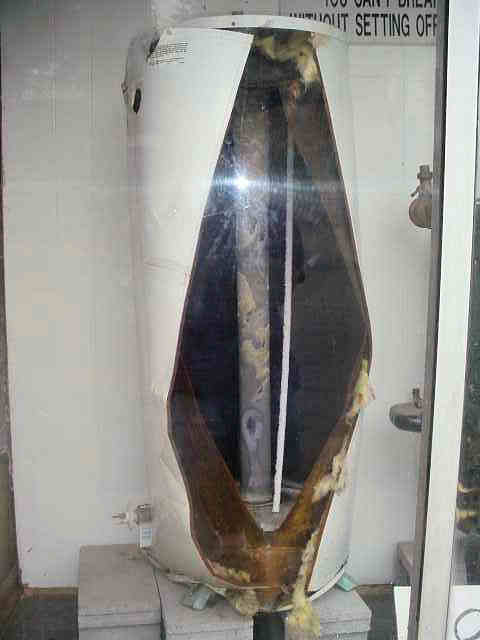
How long should a hot water heater last?
Water heaters last here in most parts of Orange County, Los Angeles County and Riverside County between 10 and 12 years. That doesn’t mean that your hot water heater will last that long or that your hot water heater will suddenly fall apart at the 10 year mark. The length of service of a hot water heater is directly tied into the quality of the heater tank, the aggressiveness or corrosion properties of the water, the temperature of the tank and the maintenance of the tank.
Somewhere along the line someone decided that you should wait until the hot water heater starts leaking before they should replace it. It caught on and now just about everyone waits until their hot water heater leaks and, in many circumstances, floods the home before deciding it’s time to invest in a new hot water source.
Call now 1.877.247.6426. We'll help with your gas hot water heater problems and your electric water heater problems.
Does this make sense to you? It doesn’t to me.
Water heaters, tank type, should be replaced every 10 years without deference as to whether or not they are leaking. The average cost of a mold or mildew claim directly related to a leaking hot water heater here in California now exceeds $25,000 in damages. Save the gambling for Vegas. Change your hot water heater out before it leaks and ensure that should it leak in the future that you have the proper catch pan under it with the leaky water draining to the outside of your home. Save yourself and your family grief and a great deal of money by treating your hot water heater the way it was designed, with planned obsolescence. Invest in a new hot water heater every ten years and chances are very good that you will never suffer the damages from a flood.
Call now 1.877.247.6426. We'll help with your gas hot water heater problems and your electric water heater problems.
How will I know when to replace my hot water heater? 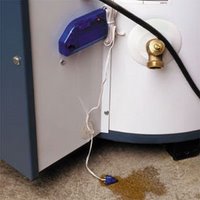
You can change it out every 10 years, wait for it to flood your home and then change it out or you can keep an eye on it, or rather an ear. If you here rumbling, the boiling of water under a layer of sediment in the tank, then it is probably time to change out your heater.
There are moisture and water alarms on the market. These alarms will light up and ring when water is present, presumably from a leaking tank. The problem with them is that they are forgotten about and the batteries go dead rendering them useless.
There are many alarms on the market and they are cheap. I don’t have any I recommend. Go ahead a Google it and purchase one. Most are less than 10 dollars.
The alarm will, of course, only work if water touches it and it has a charged battery in it. The best solution is to simply prepare for the inevitable and put a pan under the hot water heater. Inside the pan you can slip the alarm.
Call now 1.877.247.6426. We'll help with your gas hot water heater problems and your electric water heater problems.
Do I need a permit to replace a hot water heater?
Yes. The only reason I know of to not get a permit is to skimp on materials and skimp on labor. Believe me when I tell you that there are a lot of places in the installation of a hot water heater where corners can be cut, and cut to your disadvantage. The inspector for the city works for you, the homeowner, not the contractor. The inspector will ensure that the installation is safe, up to code and has been installed in the manner that the manufacturer intended it to be installed. This proper installation will help to ensure a long life span and the smallest monthly utility bill possible. If your contractor says that you don’t need a permit for this installation run away from them. They are not telling you the truth and chances are they will not install the heater properly. Permits and the law: http://www.simivalleyacorn.com/news/2008/1219/community/004.html
How do I avoid emergency hot water heater replacement?
First, you prepare for the emergency. All hot water heaters, including tankless, are going to leak sooner or later. Every one of them should have a safety drain pan under them that is piped to the outside of the home to drain away safety. If the heater leaks you will still need to mover fairly quickly for convenience and a hot shower, but you won’t be panic mode with thousands of dollars worth of water damage to your home.
The next thing you can do it change your hot water heater out every ten years whether or not it is leaking. Water heaters last 10-12 years (tank type) and 12-15 years (tankless). If your tankless hot water heater is set up properly and maintained each and every year, and you have a safety catch pan under it, you might as well wait until it leaks to replace it, but replace that tank type heater before it bursts and floods.
Call now 1.877.247.6426. We'll help with your gas hot water heater problems and your electric water heater problems. 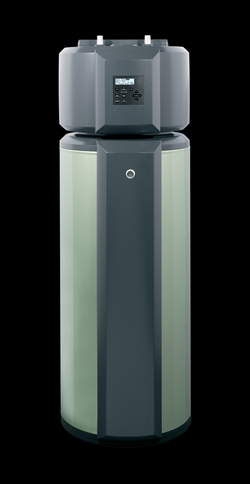
What is the most efficient type of hot water heater?
The most efficient water (Other than solar) is an electric hot water heater. Both an electric tank hot water heater and an electric tankless hot water heater are 100% efficient. There is no flue for hot gases to escape so all of the energy consumed in used to heat water. Nothing is wasted.
But there is something new on the market here in the United States. Just coming out this year is a heat pump hot water heater. These are common in Japan and will soon be common here in the United States. A heat pump is at least 300% efficient. It will far outpace any other type of heater for efficiency, but that does’t mean it will cost less to operate. Heat pumps are used to heat homes and businesses and have been in operation for decades. The technology is tried and true and it is now being applied to water heating. I don’t expect any significant hiccups when we start installing this type of system.
Gas heat here in Southern California is certainly less efficient than electric heat and far less efficient than a heat pump, but gas is so much cheaper to purchase that it is cheaper to operate.
What kind of maintenance does a hot water heater require?
Occasionally the burners need to be cleaned and the vent needs to be checked out. The system should be checked out about once a year to find small problems before they become big ones. The most common flu problem is blockage or disconnection. Improperly installed vent can literally fall apart and the vent caps above the roof can corrode through and fall blocking the exhaust gases from escaping. Many times I have seen considerable burn marks on the attic side of the roofing from hot water heaters when the venting was installed improperly or was disconnected. Blockages can cause poor combustion in the burners and they can then soot up causing a fire danger. This can also cause minor explosions in the burner chamber by the orifices that the gases travels through. Overheating and spot tank overheating can result. This will decrease the life of the heater by overheating and overstretching parts of the tank. The inner glass surface will crack and corrosion can start to happen leading to tank rupture and home flooding.
The tank also needs to be drained once a year. Our water is full of minerals and they tend to stick together when the water is heated. They then become heavy and fall to the bottom of the tank where they buildup into hard mounds of calcium. This calcium insulates the bottom of the tank and causes the metal where the burners are to become too hot. This increase in heat causes a larger than expected amount metal expansion causing the inner glass liner to crack which starts the tank corrosion process.
The temperature pressure relief valve needs to be exercised at least once a year lest it corrode shut and fail when it is critically needed. If the temperature pressure relief valve fails to seal completely the valve has failed its test and needs to be replaced. Bear in mind that if it fails it is not the person who exercised the valves fault. They did nothing wrong. The valve itself has failed. Valves that corrode shut enable the hot water heater to act as if it is a bomb. The video displayed is from Mythbusters showing the results of a plugged temperature pressure relief line. To find other examples simply type in Google “hot water heater explosion” and you will find many articles depicting the results of temperature pressure relief valve problems that resulted in great property damage and loss of life. Good website to go to is http://www.waterheaterblast.com and you will see Randall Hilton’s guide from service roundtable.
Call now 1.877.247.6426. We'll help with your gas hot water heater problems and your electric water heater problems.
How can I make my hot water heater last longer?
Follow the manufacturer’s maintenance instructions and drain the tank, power flushing it out, every year and then lower the temperature. Tanks that are set on the highest temperature, 140 degrees, not only are dangerous to the elderly and the very young, but the increased temperature dramatically increases the expansion and contraction of the tank helping corrosion to get a start. 3 seconds of 140 degree water exposure can result in a third degree burn. Keep your water at about 120 degrees for safety and tank longevity.
If your area, virtually all of Orange and Los Angeles Counties, has high mineral content and you should think about adding a softening system or a whole home filtration system. Salt is no longer a problem in the modern systems. The soft water is easier on the tank and does not allow for the calcium buildup that causes so much harm.
If you are in an area that has aggressive water, not from the Metropolitan Water District, but from well water or well water mixed with the Metropolitan Water District water, then chances are you have aggressive water. If this is the case, checking the anode rod every couple of years is a wise decision and can save your tank from premature corrosion failure.
My hot water heater rumbles and makes noise. What is the problem?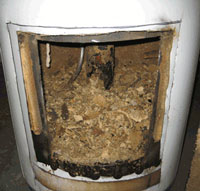
That rumbling is water boiling in the tank and it is a very bad thing. Calcium and other minerals have built up in the bottom of your tank insulating the burners from the water they are suppose to be heating. This means that the heat exchange rate from your burners to the water is very poor. Your flue gases are too hot possibly creating a fire danger. The btu output of your water is reduced making you pay for more gas to achieve the same amount of hot water. Your tank will not produce as much hot water quickly possibly leading to cold consecutive showers and the bottom of your hot water heater tank is being overheated shortening it’s lifespan.
When the bottom of the tank is insulated with calcium, mainly due from lack of maintenance, water gets trapped between the blanket of minerals and the steel tank. This water heated to the point of boiling, 212 degrees, starts rumbling. The rumbling is actually tiny explosions of superheated water bursting through the mineral blanket and coming into contact with the cooler water. Your water needs to have maintenance badly if you want it to last much longer.
Call now 1.877.247.6426. We'll help with your gas hot water heater problems and your electric water heater problems.
I have rusty water. What is the problem? What causes rusty water?
It is not caused by your hot water heater. If a hot water heater has enough rust to cause this condition it would have burst and flooded by now. Let’s narrow down the choices a little bit.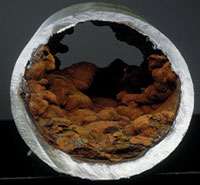
If the rust is only in the hot side, only comes out when you turn on the hot water and comes out of every fixture in the home that has hot water, the problem is almost certainly at the incoming and outgoing pipes at the heater. Hot water corrodes faster than cold water and the fitting and pipes directly in contact with the heater should probably be replaced.
If the problem is only at a certain fixture and not the rest of the home the problem is probably at the connections to the valve or at the angle stops. This occurrence most often happens when someone mixes galvanized steel fittings directly with copper. The two dissimilar metals cause an electrical current and the steel piping is sacrificed to the copper. It corrodes away very quickly. The solution would be to remove the galvanized steel piping and replace it with copper or PEX if your city allow PEX piping. As of the writing of this website, the State had passed code allowing PEX, but the cities were still resisting allowing it to come in. Pex piping is cross linked polyethylene and will probably replace copper as the tubing of choice for potable water in residential construction.
If the problem is on both the hot and cold side throughout the home the problem could be the entire piping in the home and you could need a re-pipe (please do not repipe in galvanized steel) or if the home is copper already check the water service from the meter. Many times re-pipe companies skirt the proper ways to perform a re-pipe by leaving the water service in galvanized steel to save expense and have their bids appear to low in comparison to real plumbers.
Call now 1.877.247.6426. We'll help with your gas hot water heater problems and your electric water heater problems.
I have low water pressure. What causes low water pressure?
Low water pressure and volume water volume are often confused and they are not the same. The incoming water supply to your home needs to be at least 25 psi. All the fixtures in your home are made to run with of water pressure as low as 25 psi without a problem. Go down to the local hardware store and spend $10 on a water pressure gauge. Screw it to your incoming, front, hose bib and turn the bib on with no water flowing in the home. The pressure should be between 25 psi and 75 psi. If it is lower than 25 psi call the water department it is their problem. If it is above 75 psi you have excessive water pressure, the Uniform Plumbing Code requires the use of a water pressure regulating valve if the water pressure is above 80 psi, you should install a PRV to save your home from damage. Excessive water pressure will damage your fixtures and piping.
So your water pressure is in the 25 to 75psi range. That means that you do not have a water pressure problem. You have a water flow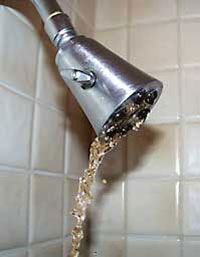 problem or a water volume problem. Note the water pressure that you have and leave the pressure gauge attached and on. Go inside the home and turn on the kitchen sink faucet or bathtub faucet and then go back outside and check the pressure gauge. What happened? If the water pressure dropped significantly, more than about 5 or 10 pounds your problem is isolated to the following: problem or a water volume problem. Note the water pressure that you have and leave the pressure gauge attached and on. Go inside the home and turn on the kitchen sink faucet or bathtub faucet and then go back outside and check the pressure gauge. What happened? If the water pressure dropped significantly, more than about 5 or 10 pounds your problem is isolated to the following:
1. The incoming valve could be partially turned off. Gate valves are famous for this. They break in the closed position or semi-closed position on a regular basis. Check it by turning it. If it turns, turn it counterclockwise until it stops. If it does not stop, it is broken and you’ve found the problem. Replace it.
2. The water meter valve is broken in the closed position or partially closed position or simply is not turned on all the way. Open the meter valve and look at it. The valve handle should be in parallel with the pipe. If it is not, turn it in parallel or call the water department and have them turn it. Many jurisdictions will fine you if they catch you turning their valves on and off, so be careful.
3. The yard line is corroded shut. If it is older galvanized steel piping this is a very real possibly. 20 years is all you get out of galvanized steel piping. Replace it.
4. The problem could be that the meter has collapsed or the city is failing to provide you with enough water. In both of these cases, call the city or the water department. If you are not at the top of a very tall hill at the end of the street, then the city should be providing you will plenty of water.
If everything is fine at the gauge then you most likely need to have your home re-piped. Give us a call we can help you. We are here to give you helping hand.
Call now 1.877.247.6426. We'll help with your gas hot water heater problems and your electric water heater problems.
Why do I need a permit to install a hot water heater?
Yes. The only reason I know of to not get a permit is to skimp on materials and skimp on labor. Believe me when I tell you that there are a lot of places in the installation of a hot water heater where corners can be cut, and cut to your disadvantage. The inspector for the city works for you, the homeowner, not the contractor. The inspector will ensure that the installation is safe, up to code and has been installed in the manner that the manufacturer intended it to be installed. This proper installation will help to ensure a long life span and the smallest monthly utility bill possible. If your contractor says that you don’t need a permit for this installation run away from them. They are not telling you the truth and chances are they will not install the heater properly. Permits and the law: http://www.simivalleyacorn.com/news/2008/1219/community/004.html
How long does it take to install a hot water heater?
The average installation of a residential gas or electric hot water heater takes about 3 hours in the home. Haul away and recycling of the heater will normally take another hour. If your installation has serious code violations and needs a lot of upgrades it could take significantly longer. Circulation pumps and piping that need to be removed that was improperly installed in the front of the heater and then reinstalled or rerouted properly increases time. If we need to add a drain pan and pipe that pan to outside of the home additional time will incur. The temperature pressure relief line cannot empty into the pan or on the garage floor. It must terminated outside the foundation of the home and be between 6” and 24” from finish grade. Regardless of the time involved, we will install your new hot water heater correctly and safely and you need not’t worry about the price. You will know how much you are investing up front and if it takes extra time the price does not change.
Call now 1.877.247.6426. We'll help with your gas hot water heater problems and your electric water heater problems.
What kind of hot water heater should I get? Tankless or Tanktype?
I’m not here to push any type of heater upon you. It is your choice. I have a tank type in my home because I, like most people, waited until my tank burst and spilled water all over my downstairs before even thinking about replacing it. I wanted a tank less (I have one at our shop), but didn’t have the time to install it as it will take 2 people usually all day to install a new one. I waited until I had an emergency and regret that I did.
Our clientele does love the tankless hot water heaters. Endless hot water and they don’t take up floor space. If you are building a home or remodeling a home, a tankless hot water heater is really the only way to go. Calculate out the square foot price of your home and then subtract about 6 square feet of that dollar amount from the installation investment of a tankless heater and I think you’ll find out that the tankless heater becomes less expensive than a tank type. We can hide them in attic. We can position them in upper cabinets or above the washing machine. We can recess them into the wall on the outside of your home. They are far more versatile than a tank type hot water heater.
Call now 1.877.247.6426. We'll help with your gas hot water heater problems and your electric water heater problems.
What is instant hot water?
It is a myth, a fairy tale, a misnomer, an advertising bonanza and a homeowner disappointment. A tank free hot water heater will not deliver instant hot anywhere in your home and will actually take a little longer to produce that first bit of hot water than a tank type. It will take a couple of seconds before the heater starts to produce hot water and then all the cold or tepid water in the tubing from the heater to the end of the fixture where the water comes out will need to be exhausted from the lines before your fixture actually produces useable hot water. The ability of the hot water to reach your working station is a function of the piping, not the heater.
Hot water circulation (improperly referred often as recirculation systems) will do the best job possible in providing hot water close to the fixture. This system either provide hot just inside of the wall or at the top of the wall depending upon how the piping was installed. This means that you still have to expend the cold or tepid water from about 4 feet to 6 feet of piping before experiencing that “instant” hot water. It will still take a few seconds in any case.
Do not buy a tank-free hot water heater to receive instant hot water at your fixtures. You will be disappointed. Give us a call for a free in home evaluation and let us help you make the right decision. We let you know the facts and that way you can make an informed decision rather than guessing what we work to suit your needs.
Call now 1.877.247.6426. We'll help with your gas hot water heater problems and your electric water heater problems.
What kind of problems to water circulation systems have?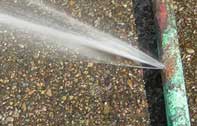
Water recirculation lines, if not installed properly, can cause many problems. If the circulation line is sized too small the water travels too fast making noise and wearing the pipe out prematurely. The slab leaks, leak under concrete, are primarily on hot water recirculation lines. If the line is sized too big the water flows too slowly and the pipe fills up sediment, calcium and mineral deposits, just like an old hot water heater does. This causes faucet stoppages and aerators to plug up and in severe cases will wear the pipe out. In interruption in water flow because of the mineral buildup causes turbulence and this turbulence will eat a hole right through the pipe.
If the line is not insulated the hot water heater the hot water heater will cycle on and off more frequently causing an increase in utility bills. If the circulation line is under concrete the resulting heat transfer can actually heat the home up causing an increase in air conditioning use.
Installed properly a recirculation pump and recirculation piping will reduce the amount of wasted water at the sinks, showers and tubs by having near instant hot water. With next to no wait time before hot water is at the fixture, convenience is increased and cold water going down the drain in search of hot water is reduced to a minimum.
Call now 1.877.247.6426. We'll help with your gas hot water heater problems and your electric water heater problems.
How do I go “Green” with a new hot water heater?
Look for the Energy Star label. It is a myth that only tankless hot water heaters are efficient. At the time of writing this website the most efficient hot water heater on the market is a tank type and tankless most often installed is no more efficient that a standard gas hot water heater.
Both tank type and tankless hot water heaters qualify as Energy Star rated and both types can get into the high 90’s percentile for thermal efficiency, but you will pay a premium for these super high efficiency hot water heaters. The really good thing going on right now (2009) is that the current presidential administration is bent on redistributing wealth (playing Robin Hood by taking from the haves and giving to the have nots) and that have 30% tax incentive, up to $1500, for the installation of a high efficiency heater. This really helps to offset the cost. Energy Star Tax Incentive.
The government, most likely through campaign contributors and industries pressures, are hell bent on going tankless. Storage tanks also qualify for the tax incentive provided that they are at least 90% thermal efficiency.
Call now 1.877.247.6426. We'll help with your gas hot water heater problems and your electric water heater problems.
My water stinks. Why does my water smell like rotten eggs?
The stinky water smell that originates in your hot water heater comes from bacteria in water reacting to the sacrificial anode rod in the tank. This reaction lets off hydrogen sulfide gas and that gas is the odor that you smell. This does happen on occasional here in Orange County, Los Angeles County and Riverside County.
Water softening using salt causes the smell to worsen as the increase in salt in the water allows the water to conduct electricity better. The better conduit for electricity the water is the faster the anode rod is given up to the heater tank and the more hydrogen sulfide gas is produced.
To find out a fix for this condition see the section on tank type hot water heaters.
Call now 1.877.247.6426. We'll help with your gas hot water heater problems and your electric water heater problems.
 What size hot water heater do I need for my home? What size hot water heater do I need for my home?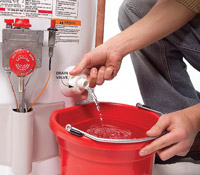
For tank type hot water heaters 1 to 2 bath homes should have a 40 gallon gas or electric hot water heater. 3 bath homes should have a 50 gallon gas or electric hot water heater. 4 bath homes should have 75 gallon and 5 or more baths should have 100 gallon. These are all standard recovery tank heaters. For tank-less hot water heaters see the page on tankless.
I run out of hot water within minutes. Why do I run out of hot water?
 I run out of hot water within minutes. Why do I run out of hot water? I run out of hot water within minutes. Why do I run out of hot water?
For tank type hot water heaters the problem is most likely a broken dip tube. For more tank type lack of hot water reason see the section on tank type hot water heaters. For tank less hot water heaters the number one reason is an undersized gas line. The undersized gas line creates a lack of flame and a carbonizing flame that can destroy the heater. See the section on tank less hot water heaters for a more detailed explanation.
If you have an electric hot water heater the problem can be a dip tube, but most likely your lower element is not working and only the upper part of your tank is hot water.
Call now 1.877.247.6426. We'll help with your gas hot water heater problems and your electric water heater problems.
What is an anode rod?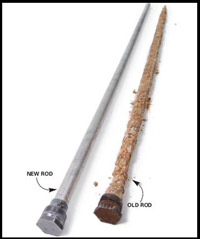
In tank hot water heaters a sacrificial metal rod is inserted into the heater to help prevent rust. The material is usually magnesium or aluminum. Once the tank starts to corrode, an electrical current is developed in the water between the tank steel and the anode rod. This is called electrolysis and when two dissimilar metals touch each other, this touch is through the water in the tank, the weaker metal dissolves and coats the stronger one. The aluminum or magnesium passes through the water to coat the tank protecting the steel tank from further corrosion. Without an anode rod the tank probably wouldn’t last much longer than a year.
Call now 1.877.247.6426. We'll help with your gas hot water heater problems and your electric water heater problems.
How do I change out an anode rod?
Do not change it out unless you have a replacement. You might not be able to find one except through the internet. If you have one the way to change it out is turn the water off and use an impact wrench, the wrenches used to remove tires from cars, and back it out like any other bolt. Cost the new one with pipe thread sealant (I am not a fan of Teflon tape as the tape tends to leak, and screw the new rod back in. If you don’t have an impact wrench you can use 2 pipe wrenches. I prefer Rigid cast iron and I prefer a combination of one 18” wrench and 1 24” wrench. Put the 18” on the anode in the tank securing it as tight as you can make it. Now put the 24” wrench on the end handle of the 18” wrench and then push towards the wall being very careful not to slip. If you look at the physics of this type of set up you will find that uses a compound wrench setup will increase the distance the end of wrench travels by twice or more. This increase in travel magnifies your strength and this usually works to remove the anode rod. The reason you push it that the wall will hold the heater upright for up.
If this setup doesn’t work then put the 24” wrench on the anode rod and tap the end of the handle with a 3 or 5 lb sledge hammer until the impact loosens the anode.
Call now 1.877.247.6426. We'll help with your gas hot water heater problems and your electric water heater problems.
What can go wrong with a gas hot water heater?
That depends on how complicated the heater is. On standing pilot models the number problem right now is the combustion chamber holes are plugging with lint and starving the burners for air. When the Southland went to the safer hot water heaters with the flame resistance screens (FVIR) it complicated the burning process and has led to a significant increase in pilot outages.
On all gas hot water heaters venting is a key issue. An improper vent can stifle the pilot light putting it out and cause flue fires as well as carbon monoxide poisoning. See the section on tankless and tanktype hot water heaters for more details.
What can go wrong with an electric hot water heater?
Calcium and mineral buildup in the tank can reach the lower element and then the lower element burns out. Thermostat failure and electrical fire in the controls of the heater. The vast majority of electrical problems in electrical hot water heaters are due to poor electrical connections which heat up and burn the contacts in the heater. This causes the controls to malfunction.
How do I diagnose a problem with an electric hot water heater?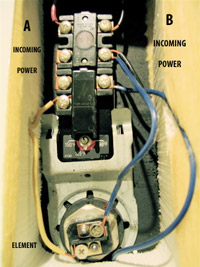
First you must have an multimeter that checks 240 volts and has an amperage clamp. Amperage is the amount of electricity that is being used.
First, what is the problem? Step by step diagnosing is fairly simple. Turn the power off to the hot water heater and verify this by checking with your meter. Take the upper and lower element doors off, remove the fiberglass insulation and remove the plastic protector. Now verify power is off. With your meter set to AC voltage (240 or 600v) test both A & B power put putting your black lead on the tank scraping a little to get a good connection and put the other lead on A and see if it has power. Now put the lead on B and see if it has power. If no power you are good to proceed.
Take one of the wires off the screw terminal on the upper element and just let it hang there. Set your meter to Ohms or audible ohms. I prefer audible. Touch the two leads on the meter together. They should let off a shrill steady beep. This tells you your meter is set correctly. Put the black lead on one the screws on the element and the red lead on the other screw and listen. If your do not hear the shrill beep the element is “open” and must be replaced. Follow this same procedure for the lower element.
If the problem is that the water is way too hot then this is usually the lower element shorted out to the water or calcium mineral buildup in the tank and is conducting electricity directly into the water completely the circuit on the element. This allows the element to continually heat without regard to the thermostat. Water heater elements are usually 240 volt and usually only one leg of the electricity goes through the thermostat. They are live all the time. The first test should find this problem. If the first rest doesn’t find this problem you should turn the setting on the thermostat all the way cold on both the upper element and the lower element (use a screwdriver to turn the screw setting) and then turn the power back on to the heater after making sure all the wires are connected properly.
Once the hot water heater is on you need to set your meter on amperage and use the amperage clamp carefully. Clamp each wire separately going to each element. The reading should be zero amps. If, with the thermostats turned off or down all the way, you have a reading the element is shorted to the water and it needs to be replaced. The amperage doesn’t have to be a lot to create hot water.
Most electric elements are 4500 at 240 volts. To find out the amperage simply divide 4500 by 240 and the amperage reading for a fully functioning element will be about 18.75 amps. If you have 220 incoming voltage the amount changes to about 20.45 amps.
Call now 1.877.247.6426. We'll help with your gas hot water heater problems and your electric water heater problems.
How do I change out an electric hot water heater element?
Turn the power off and verify that it is off. Observe the element and make sure that you have the right replacement element. There are three types. Most of the time it is a screw-in low-density element you will be changing. The difference between a low-density element and a high-density element is the low-density element is for the lower element as it has about twice the surface area and doesn’t get as hot. It still puts out the same heat, but that heat is spread out across a larger surface area. This allows the calcium and mineral buildup to touch the element without immediately burning it up. Low-density can be used for the top element and it is what I typically install.
I never empty the hot water heater, but if this is a first time you have ever done this, you might want to prevent a mess. If you are not going to empty the hot water heater then turn the entire homes water supply off and open up an exterior hose bib to depressurize the home. Do not open up every faucet in the home. The hose bid is sufficient to depressurize. We do not want to drain the home and we want the water system in a vacuum. The vacuum is automatically created.
The screw in element uses an 1 ¼” socket and I use an 1 ¼” socket rather than the thin bell socket that you can purchase cheaply. The thin walled “hot water heater element socket” is really a piece of garbage and can bend and warp when using it. Remove the other element from its package. Have a few rags or towels right in front of the hot water heater to soak up any water that comes out. You should only lose a cup or so of water out of the hot water heater.
Unscrew the element and pull it out. It may be difficult to pull out as the low density element could have warped in the water. Pull hard and insert the new element and tighten. You do not need pipe dope as the element has a rubber seal on it. Reconnect your wires and your done.
Call now 1.877.247.6426. We'll help with your gas hot water heater problems and your electric water heater problems.
Can I install my hot water heater outside?
Most tank type hot water heaters must be installed in a shed and about ½ of tankless models must be installed inside. Only specially designed hot water heaters are made to withstand the elements.
What brand of hot water heater is best?
This is more of an opinion than anything else. The plumber you use is more important than the brand. The plumber has far more opportunity to screw up the installation than the manufacturer of the heater ever will. I prefer Bradford White hot water heaters for tanktype, perhaps the last brand actually made in the United States, and I prefer Nortiz Tankless for warranties, ease of installation. Both these brands give great factory support.
Call now 1.877.247.6426. We'll help with your gas hot water heater problems and your electric water heater problems.
What is a Dip Tube?
The dip tube is the plastic inlet tube in your hot water heater that brings the cold water to the bottom of the hot water heater. This allows the upper part of the tank to hold hot water and prevent incoming cold water from mixing with existing hot water. When the tube breaks off it mixes cold water into the hot water and this greatly reduces the efficiency of the unit and the duration of hot water exiting the unit. If you remove the incoming water nipple from the hot water heater the dip tube is usually attached to it. Many mobile home hot water heaters do not have dip tubes as the cold water inlet is at the bottom of the heater.
Call now 1.877.247.6426. We'll help with your gas hot water heater problems and your electric water heater problems.
My children take their showers and I never get a hot bath, what is the problem?
Too small a heater. You should upgrade to a tankless. The showers that your children are taking having unregulated shower heads. Try a new shower head and the flow rate will be reduced to at least 2.5 gallons a minute. Your hot water heater could be set on too low a temperature. The maximum temperature is 140 degrees and it is recommend that you keep your hot water heater between 120 to 130 degrees.
Call now 1.877.247.6426. We'll help with your gas hot water heater problems and your electric water heater problems.
How much does it cost to run my hot water heater? 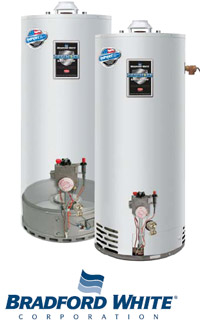
The average household spends about 15% of their utility bill on hot water. It is why it is important to have a hot water heater that is very efficient and properly installed.
What does Thermal Efficiency mean?
Thermal efficiency is like money. If your hot water heater has a thermal efficiency of 85 that means for every $100 in gas usage you incur you actually sent $15 up the flue to heat the great outdoors. It was wasted. Water heaters currently can have as high as 98% thermal efficiency. The higher the thermal efficiency, the lower your utility bills.
Call now 1.877.247.6426. We'll help with your gas hot water heater problems and your electric water heater problems.
What does Energy Factor mean?
For hot water heaters using an Energy Factor or EF rating, the standby loss is included in the calculation of the EF. The standby loss is amount heat measured in btu’s that is lost through the tank waiting for water use. In all cases, the efficiency is better the higher the rating Energy Factor or Thermal Efficiency.
How do I find out what BTU my gas hot water heater is?
It is on the label typically above the gas valve.
What is first hour recovery?
A very important factor in choosing a hot water heater, the First Hour Rating reveals how much hot water a hot water heater can produce the first hour of operation after the initial heating of the tank. The rating, in gallons of hot water is calculated by adding the number of standby gallons the water holds (40-50-75-100) plus how many gallons of water the heater can heat in the first hour of operation.
Call now 1.877.247.6426. We'll help with your gas hot water heater problems and your electric water heater problems.
Do I have a high recovery hot water heater?
If it is a high recovery it will say so on the label. High recovery hot water heaters are in excess of 40,000 btus.
Who makes hot water heaters. What brands of hot water heaters are there?
 Water heaters to avoid. Water heaters to avoid.
I apologize. I had to remove the complaints of poor quality craftsmanship and lack of guarantee complaints on the big box retailers due to threat of litigation. If you want to see how good a job your local home improvement is doing installing hot water heaters simply Google the following: ("name of the big box retailer", water heater complaints).
 Your warranty is only as good as the company that put it in. Big box retailers (you know who I am talking about) guarantee nothing when you purchase an installation from them. Read the fine writing on the agreement. You end up signing away any legal recourse. Your warranty is not worth much more than the paper that it is printed on. Your warranty is only as good as the company that put it in. Big box retailers (you know who I am talking about) guarantee nothing when you purchase an installation from them. Read the fine writing on the agreement. You end up signing away any legal recourse. Your warranty is not worth much more than the paper that it is printed on.
Jim & Stephanie
Give us a call today and find out how much money we can save you on a new gas hot water heater or electric hot water heater installation.
Same Day Service....No Worries....No Problem
map |
 |
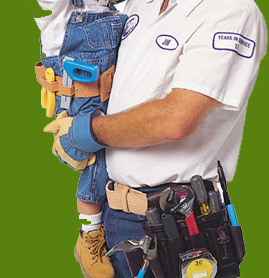 |
|
|











